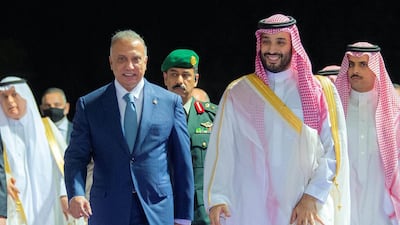The summit of regional leaders with US President Joe Biden presents Iraq's Prime Minister Mustafa Al Kadhimi with the opportunity to showcase his credentials to continue leading the country and cement its role as key player in the Middle East, experts say.
Saudi Arabia will host the meeting between Mr Biden, leaders of its fellow Gulf Co-operation Council members, and of Iraq, Egypt and Jordan, in Jeddah on Saturday, before the US president concludes his first visit to the region since taking office last year.
Mr Al Kadhimi is expected to hold separate talks with Mr Biden on Friday night.
“The summit is more significant for Prime Minister Al Kadhimi than for Iraq, per se, as it is an opportunity for Kadhimi to show that Iraq can be a top-level regional player with him at the head,” said Michael Knights, a fellow at the Washington Institute who studies Iraq's military and security.
“If another premier were leading it is unlikely Iraq would be given an invitation to Jeddah,” Mr Knights told The National.
Mr Al Kadhimi wrote in an op-ed for Foreign Policy magazine this week that he would represent a "resilient Iraq" to the region and the US.
His participation bolsters his prospects of remaining in office beyond his current caretaker status, with Iraqi political factions in a deadlock over formation of a new government after a general election in October. It also continues Baghdad's participation in regional discussions that are crucial for Iraq.
"It is also designed to encourage any possible successor to continue the same policies of balancing Iraq between Iranian and US pressure and finding ways of reintegrating Iraq into the Arab world," said Hussein Ibish, an academic at the Arab Gulf States Institute in Washington.
Ties between Iraq and the region must be strengthened to help Baghdad "revitalise and rebuild Iraqi-Jordanian economic, diplomatic and political ties and, ultimately, revive the Iraqi-Jordanian-Egyptian triangle in the Middle East and in the Arab world", Mr Ibish told The National.
This would be extremely beneficial to all parties except Iran, Mr Ibish said.
Sajad Jiyad, a fellow at the Century Foundation in New York, said Baghdad's participation in the summit provides it with a “say in some of the negotiations that are going on concerning the region”.
“Iraq is an important state to the region and so its participation in regional summits like this one will give it a say in its future and making it clear what are the challenges it faces,” he said.
Baghdad has good relations with Iran and so it does not want Saudi Arabia, US and others to negatively impact their ties, Mr Jiyad said.
“It does not want to be destabilised by the impact of deteriorating relations between Iran and Saudi Arabia or Iran and the US,” he said.
"Mr Al Kadhimi was recently in Saudi Arabia and Iran so I’m sure there are some messages he wishes to convey to the region."
Mr Jiyad said economic co-operation would be at the top of Mr Al Kadhimi’s agenda, with many projects put forward between Baghdad and Gulf states but little progress so far.
Improved ties with Riyadh
Relations between Saudi Arabia and Iraq have improved rapidly since Mr Al Kadhimi took office in May 2019.
"Saudi leaders know Al Kadhimi well from his period as head of the Iraqi National Intelligence Service. Aramco has, for the first time, seriously looked into investing in Iraq, and Saudi Arabia is readying to give Baghdad cheap electricity and new trade advantages," Mr Knights said.
However, this momentum might be lost under a new government, he said.
"These ties are fragile, however, and probably cannot survive a major change in the leadership in Iraq," Mr Knights said.
Ties between Saudi Arabia and Iraq were cut after Saddam Hussein's invasion of Kuwait in 1990 and restored only in 2015, when the kingdom reopened its embassy in Baghdad.
Concerns remain over the rise of Iran-backed political groups following the 2003 US-led invasion that toppled Saddam.
"Saudi Arabia came to view Iraq as an incorrigible, hopeless vassal state of Iran, totally overrun by pro-Iranian militias and dominated by Iran‘s Islamic Revolutionary Guard Corps," Mr Ibish said.
He said Baghdad's ties with Riyadh are crucial and Mr Al Kadhimi must succeed in portraying Iraq as an independent state free of Iranian domination.
"The biggest challenge for Iraqi-Saudi relations from Baghdad's perspective should be, and probably is, how to convince Saudi Arabia and other Arab countries that Iraq is a net benefit and will not ultimately prove to be little more than a useful weapon for Tehran in some form or another," he said.































































